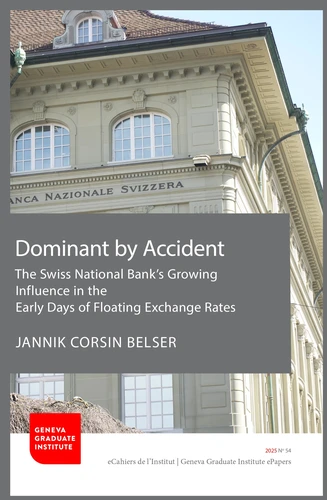Dominant by Accident. The Swiss National Bank’s Growing Influence in the Early Days of Floating Exchange Rates
Par :Formats :
Disponible dans votre compte client Decitre ou Furet du Nord dès validation de votre commande. Le format Multi-format est :
- Pour les liseuses autres que Vivlio, vous devez utiliser le logiciel Adobe Digital Edition. Non compatible avec la lecture sur les liseuses Kindle, Remarkable et Sony
 , qui est-ce ?
, qui est-ce ?Notre partenaire de plateforme de lecture numérique où vous retrouverez l'ensemble de vos ebooks gratuitement
Pour en savoir plus sur nos ebooks, consultez notre aide en ligne ici
- FormatMulti-format
- ISBN978-2-940600-58-8
- EAN9782940600588
- Date de parution06/01/2025
- Protection num.NC
- Infos supplémentairesMulti-format incluant PDF avec W...
- ÉditeurGraduate Institute Publications
Résumé
The 1970s was a decisive decade in monetary history as the switch to floating exchange rates made central bankers weighty actors in economic policymaking. This paper will show that this rise in power was not pronounced by decree in the Swiss case. Politicians eyed the Swiss National Bank's growing influence critically, some flirting with installing fiscal dominance. However, faced with widespread sympathy for central bank autonomy among the business community, political attacks on the SNB were not organised.
In addition, many felt that the legal status quo of close cooperation between the Federal Council and the SNB Governing Board would keep decision-making within the reach of elected politicians. In an increasingly complex world of finance, the SNB established a position of expertise vis-à-vis the government and became the dominant force in monetary policymaking. This outcome was not driven by political choice but by structural conditions.
In addition, many felt that the legal status quo of close cooperation between the Federal Council and the SNB Governing Board would keep decision-making within the reach of elected politicians. In an increasingly complex world of finance, the SNB established a position of expertise vis-à-vis the government and became the dominant force in monetary policymaking. This outcome was not driven by political choice but by structural conditions.
The 1970s was a decisive decade in monetary history as the switch to floating exchange rates made central bankers weighty actors in economic policymaking. This paper will show that this rise in power was not pronounced by decree in the Swiss case. Politicians eyed the Swiss National Bank's growing influence critically, some flirting with installing fiscal dominance. However, faced with widespread sympathy for central bank autonomy among the business community, political attacks on the SNB were not organised.
In addition, many felt that the legal status quo of close cooperation between the Federal Council and the SNB Governing Board would keep decision-making within the reach of elected politicians. In an increasingly complex world of finance, the SNB established a position of expertise vis-à-vis the government and became the dominant force in monetary policymaking. This outcome was not driven by political choice but by structural conditions.
In addition, many felt that the legal status quo of close cooperation between the Federal Council and the SNB Governing Board would keep decision-making within the reach of elected politicians. In an increasingly complex world of finance, the SNB established a position of expertise vis-à-vis the government and became the dominant force in monetary policymaking. This outcome was not driven by political choice but by structural conditions.



